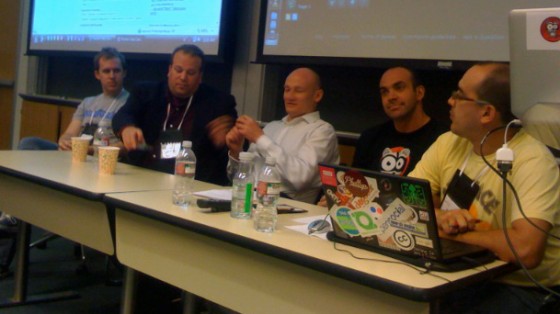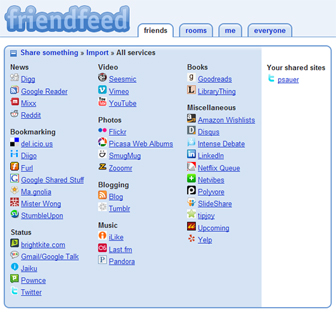Interview with FriendFeed
Steve Gillmor and I did a video interview with Bret Taylor from FriendFeed. There are some interesting responses and content in here and it expands on a few points that were discussed during a panel today at the Supernova 2008 conference.
To begin with, Bret states that they re-thought how FriendFeed could work as a communication tool, and are contemplating supporting the XMPP format (Jabber). XMPP support would mean that a whole suite of products could be used with FriendFeed. While Bret didn’t offer a firm commitment, it is apparent how their development of the product and their planning has adapted since the product launched.
We also touch briefly on formats, and FriendFeed will be adding support for generic media feed types, in the same way it currently supports blogs. This will be based on Media RSS, which allows for photo, audio and video enclosures within RSS feeds. It means that developers of applications who currently aren’t directly supported by FriendFeed will be able to publish a standards-based feed and have their users plug it into FriendFeed. We hope that the other data types (events, short-form messaging etc.) are also developed into standards, and it seems that we are heading in that direction (albeit slowly).
Bret also gives us a bit of a background into how FriendFeed was developed, its growth and popularity.
SuperNova 2008: Panel on Liquid Conversations
 Today at Supernova the Liquid Conversations Panel will be talking about how personal content, text, video and comments can be separated from individual websites and shared across the net and personalized. Dave McClure will be moderating the panel of David Sifry, Bret Taylor, Matt Colebourne and Loic Le Meur.
Today at Supernova the Liquid Conversations Panel will be talking about how personal content, text, video and comments can be separated from individual websites and shared across the net and personalized. Dave McClure will be moderating the panel of David Sifry, Bret Taylor, Matt Colebourne and Loic Le Meur.
What are liquid conversations?
What is new and happening in distributed conversations? FriendFeed, which is a content discovery tool and aggregates all the things you share on the internet with people you know. It is modeled on a social network, so you can leave comments on content and share it with your contacts and friends. FriendFeed allows distributed conversations to take place amongst friends, contacts and amongst individual groups. With individual groups the conversation can be personalized.
The audience was asked wether web publishing is seen as easy, not-so-bad or hard. Most of the audience responded that posting content to the web is relatively easy, which has allowed a large audience to participate in web-based conversations.
CoComment is similar to FriendFeed, but it aggregates your comments across all the blogs where you have left a comment. It allows you to see all those conversations in a single place, but does not offer the personalization layer as FriendFeed does. CoComment points out that with decentralized conversations, the process is more democratic as site owners are not able to censor comments, allowing all those participating to participate equally.
The audience was asked if they blog and how frequently they blog, and the majority response (no surprise for such a conference) was that the majority blog frequently, and the majority also comment frequently (and the trend is that blog commenting is increasing over time).
Loic from Seesmic gave a video demonstration of a distributed video discussion, talking about the “g-spot” (hint: it’s not about Google). See the video here (recorded with Seesmic, very Hofstadter)
Update: Much better video (ie. not recorded from a dying macbook)
http://seesmic.com/Standalone.swf?video=wUc5D4bCtQ
Who owns comment content?
One big issue with all of the different conversation aggregators is around the ownership of comments. When you post a comment to a blog, who owns that comment? Many of these services directly copy the comments off and will place them within their own applications – so the question is how copyright and ownership works in these instances (in the same way that it isn’t kosher to completely copy a complete blog post, it shouldn’t be kosher to copy a complete comment). There is a lot that needs to be done in terms of copyright controls, because currently when you leave a comment on a blog you cannot choose the terms under which you release that content. A blogger is able to include a creative commons license, as well as associated markup for machines to read the license terms, but commenters are currently handing over ownership of their comments as soon as they post.
CoComment says they don’t take their users away from the original content site, so you can only leave a comment on the original site. FriendFeed behaves slightly differently in that they copy the contents and a lot of the conversation happens outside of the original source and outside of the original comment. There seems to be many more questions than answers at the moment about comment ownership, and there are different approaches from the different conversation aggregators in terms of how to handle it. I wonder when we will see the first legal notice from a comment owner to take down a comment that has been copied? With blog posts as comments, where you post to your own blog and use a trackback, you can at least control your content rights.
CoComment just announced that they are now also supporting video comments and that they have integrated with Seesmic (which Loic was happy to hear). It seems that the Seesmic API is getting a lot of traction and use with sites looking to implement video comments.
Decentralized Commenting Systems
Dave McClure is demonstrating a number of different decentralized comment products. There seem to be a bunch of them at the moment, such as Disqus and SezWho. The basic principal with each of these is that instead of using the standard blog comments on your blog, you include Javascript and have a comment thread hosted by your provider, on your own blog, but it enables social features such as aggregating conversations from other blogs, showing you your comment history and a lot more. There are other similar products that work differently – CoComment doesn’t require the blog to change their commenting system, it lives in the commenters browser. FriendFeed is different again in that it pulls the content into a central location, from where users can add to the conversation. These commenting systems are now also supporting short-form text, blog posts and trackbacks, video and a lot more – and seeing Disqus or SezWho on a blog is becoming more and more common.
Standards Support
As questions came up as to how all the different formats can be brought together, for instance at the moment there are 40 different badges on FriendFeed, representing all the different types of comments. Will these formats converge towards OpenID and data portability standards? The practicality of such a solution has not been vetted yet, but there are a significant number of players supporting it which is a good sign. If it could be unified at least across identity, it would be a good start.
FriendFeed has a discovery tool, and has added tools to analyze conversations to pull out the best of the comments and contents. Having more data is a good problem to have. It is currently difficult to find this content, as there isn’t a guide.
I believe it is very important to get these standards organized. Spot what is wrong this this picture:

Currently to support a new data type, these services such as FriendFeed need to specifically support each API. There is currently no standard API, where you can just add a URL (eg. just click add, then enter twitter.com and have it add that data). All of these services are just feeds, and feeds of specific types. For example, a blog is a feed of text, Flickr is a feed of photos, so we need a standard feed type and then format extensions to support all the different data types (blog posts, pictures, events, podcasts, music, short-form text, bookmarks, status messages, etc.). There is a lot of data portability talk, and while OpenID seems to be the consensus for identity management, there is currently no consensus or a format spec to support each of these feed types. Currently it is very fragmented, and nobody on the panel yet has mentioned how these standard formats will be developed, if they ever are.
FriendFeed responded to say that they will be adding support for generic media RSS formats, such as generic photo, text of video streams. This seems like a very good step forward, which will allow users to add supported media feed types rather then specific services.